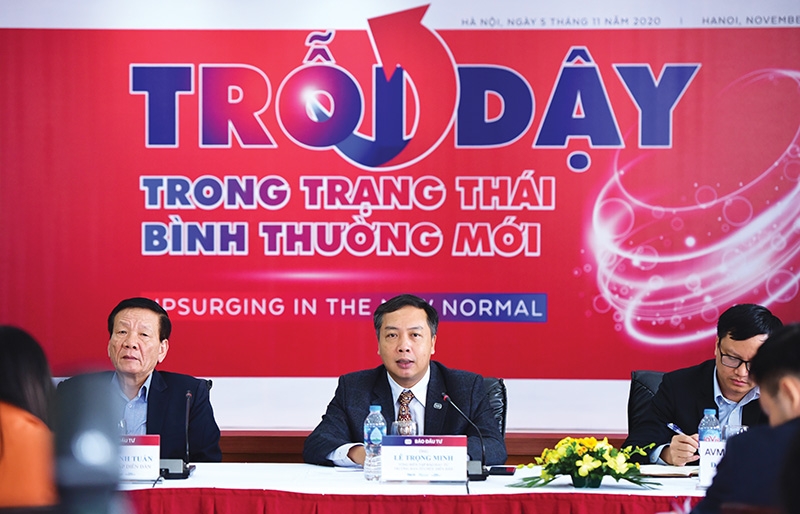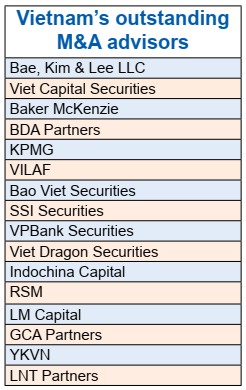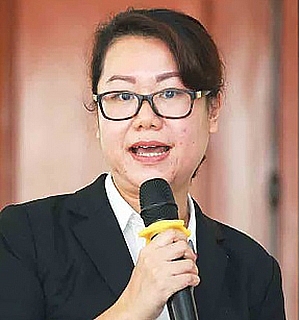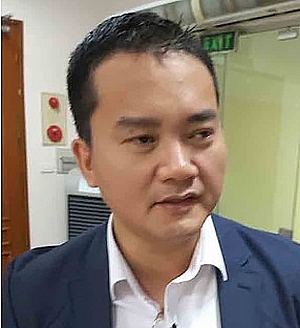Vietnam looks to kick-start rejuvenation of M&A deals
 |
| VIR editor-in-chief Le Trong Minh (middle) emphasised the bright prospects of M&A in Vietnam at the M&A Forum press conference last week, photo Dung Minh |
The ongoing pandemic has caused a decline of 25 per cent in mergers and acquisitions (M&A) deal valuation across the world in the first half of this year.
In Vietnam, total M&A deals in 2019 reached $7.2 billion, but due mainly to COVID-19, this year’s figure is projected to decrease to $3.4 billion, equivalent to 48.6 per cent of last year, cited from Vietnam M&A Forum Research Group (MAF Research).
Meanwhile, the Corporate Investment and Merger and Acquisition Centre - the co-founder of Vietnam M&A Forum - forecast the market to rebound following a V-shaped trajectory during 2021-2022, hitting $4.5-5 billion in 2021 and $7 billion in 2022.
According to Prof. Ha Ton Vinh, chairman of consultancy Stellar Management Corporation, and former White House political appointee under Reagan and Bush administration, Donald Trump and Joe Biden offer a resoundingly distinct choice on economic and regulatory issues.
“In the first two years of Biden’s administration, he could revert many of Trump’s policies. In a broader context, Biden’s economic policies would likely be more conventional than Trump’s, especially regarding collaboration with US allies around the world. Hence, the Trans-Pacific Partnership, which Trump withdrew from in 2017, might be resumed. Either way, the Vietnamese economy will still benefit, which equals to a good impetus for M&A activities in general,” Vinh said at the press conference announcing Vietnam M&A Forum 2020 in Hanoi on November 5.
Revitalised ventures
 |
Talking with VIR, Nguyen Thi Van Khanh, senior director of Capital Markets at JLL Vietnam, said that the unprecedented public health challenges have been a bitter pill to swallow for many financiers, and it will undoubtedly have a temporary negative effect on the industry as a whole. However, in the current low interest rate environment, many corporations such as Vinhomes, Masan, and Novaland opt for issuing corporate bonds as an effective mobilisation channel.
“High investor demand is fuelling corporate bond issuance. In 2021, we predict that investors from South Korea, Japan, and Singapore will likely continue showing keen interest and strong commitment in Vietnamese property M&A due to the market’s vast potential,” Khanh said.
MAF Research stated that Danh Khoi Group is one of the most talked-about names this year as it bet big on revitalising “hibernating” tourism-related projects. One notable example is the group’s full acquisition of a subsidiary of Tokyo-headquartered Sun Frontier Fudousan to officially become the investor of the Sun Frontier project in the central city of Danang. The deal is roughly worth $920 million – the single highest valuation in the property market recently.
From June 2019 to September 2020, the real estate sector accounted for nearly 40 per cent of the M&A market in Vietnam, as shown by MAF Research.
Pham Mai Huong, director of Deal Advisory at KPMG Vietnam, emphasised that M&A deals are still appreciated for their ability to add value for the buy-side’s ecosystem. For example, Masan Consumer Holdings acquired Vingroup’s VinCommerce and VinEco to establish a leading consumer retail group by accessing a network of nearly 3,000 supermarkets and convenience stores nationwide.
As one of the leading M&A advisors globally and locally, KPMG has adapted to the new normal, with virtual meetings becoming an essential part to speed up M&A deal-making.
“Notwithstanding, challenges still colour the landscape, particularly physical constraints for cross-border deals because international flights has become highly restricted. These difficulties have slowed down deal execution due to the lack of physical observations and in-person negotiations. Unfortunately, the outbreak will prolong deal processes and make them more difficult to complete, especially for foreign investors,” Huong explained to VIR.
Consumer market experience
Vu Le Trung, partner at Vietnam International Law Firm, said that he had been involved in the tie-up deals of Japanese Shinsei Bank acquiring 49 per cent of MCredit – the consumer finance arm of Military Bank – and Sumitomo Mitsui Trust Bank’s acquisition of 49 per cent equity in BIDV Financial Leasing Company.
“I believe the Vietnamese financial landscape is a fertile land for foreigners, especially when a lack of capital still ails some local lenders. However, potential suitors might be held back by the 30-per-cent foreign ownership cap in the banking sector in Vietnam. On the flip side, consumer finance is still shining bright, enticing many high-profile investors,” he added.
According to the Ministry of Finance, the scale of the consumer finance market in 2019 came to around VND1 quadrillion ($43.47 billion) from just VND646 trillion ($28 billion) in 2016, accounting for 11.4 per cent of the country’s total outstanding balance. The Vietnamese government’s strong ambition to crack down on shadow banking and loan sharks is slated to propel the market’s further development.
Fresh data from market research firm FiinGroup shows that for the first time in a decade, the Vietnamese consumer finance market experienced single-digit growth (9.2 per cent on-year in the first half of 2020), following aggressive credit growth over the past few years. This is attributed to the dual challenge of the COVID-19 pandemic and tightening regulations on cash loans. However, despite the modest growth rate, Vietnamese consumer finance maintained a contribution of over 20 per cent of the country’s loan books.
According to SSI Asset Management, a subsidiary of Vietnamese brokerage SSI Securities and Japan’s Daiwa Corporate Investment Asia, Vietnam has consistently been one of the fastest-growing economies in the world and the region’s top foreign investment destination. Healthy twin account surpluses with increasing foreign exchange reserves, improving the local banking sector with stable interest rate and inflation, provide Vietnam macroeconomic stability and a stronger local currency. Extremely fast urbanisation process, growing middle class, and increasing disposable income are expected to drive strong growth in consumer-related industries.
At the same time, local enterprises are benefiting from global export opportunities, thanks to the many strategic free trade agreements in place such as the EU-Vietnam Free Trade Agreement. A resilient and improving business environment, helped by the effective containment of COVID-19, and strong internal growth, further boost Vietnam’s unique competitiveness appeal.
Vietnam ranks second out of 50 economies on the index measuring the attractiveness of M&A environments released by London-based market research firm Euromonitor International. Meanwhile, MAF Research believed that property, consumer goods, retail, and agriculture will be the major spotlights in luring foreign M&A activity in 2021.
| Do Van Su - Deputy director general, Foreign Investment Agency
Business relocation is caused not only by the pandemic this year, but also over previous years as some countries became conflicted in terms of trade. Thereby, some solutions on investment and trade protection have been raised, and multinational corporations relocate to avoid tax. COVID-19 has not made anyone “wake up”, but some corporations and even economies have also been startled and realised that dependence on only one country or location is too risky. COVID-19 is simply pushing forward the process of making decisions faster. In order to welcome a new investment wave, Vietnam has been ready on infrastructure, human resources, and policies. M&A-related laws on Securities, Enterprises, and Investment have also just been amended within the past year, as well as that on public-private partnerships. Thanks to these, there are new methods in which investors can enjoy economic benefits and new ways for them to contribute capital and buy shares in an enterprise – especially enterprises and sectors that overseas investors are not allowed to hold more than a certain ratio in. I believe that this will be an attractive investment channel for them in the time coming. Tran Thi Bao Ngoc - Head of Prestige Wealth Management, VPBank Securities
Over the past few years, many finance companies in Vietnam are working with deep-pocketed international partners to strengthen their operations. Furthermore, to keep up with ever-evolving technology, consumer finance companies in Vietnam have to be well-positioned to engage with the new wave of digitally-empowered customers. Foreign investors will place their focus on digitally-led firms since they could easily make credit accessible to individuals across the country. Currently, many consumer finance companies are backed by local banks, such as FE Credit and VPBank, SHB Finance and SHB, and HD Saison with HDBank. I do believe that forthcoming M&A deals from foreigners will facilitate domestic consumer finance companies to deliver better services to customers with better cushion, ample liquidity resources, and a stable operation structure. Fabrice Carrasco - Strategic Initiatives regional director, Asia Kantar Worldpanel
Vietnam is anticipated to remain active in M&A activities to continue flourishing. There are key reasons why we think the M&A market will be further boosted. With big human resources and low cost, Vietnam will gain more attention from foreigners partly due to the shift from China to developing Asian markets and the dispute between the US and China. In addition, there is positive outlook on economic growth and consumer confidence during COVID-19 time and after the pandemic here. Improvements from the government in terms of investment regulations to attract investors, as it is one of the key economic growth drivers, and will be a vital lever to recover the economy faster. The development plans and aggressive expansion from both state and private businesses for suburban and rural areas hold great promise to tap into. Last but not least, fast-moving consumer goods and food and beverages – in particular both take-home purchases and out-of-home consumption – are on the upward trend. There are two main trends that will be more likely to occur in 2021 and beyond. Firstly, businesses will aim to expand both horizontally and vertically. This means there will be cross-category and cross-industry M&A deals. Secondly, cross-border acquisitions are expected to dominate M&A deals in the coming years yet domestic cooperation will emerge to strengthen the competitiveness of local players. Nguyen Thi Van Khanh - Senior director, Capital Markets, JLL Vietnam
Real estate is still one of the major sectors for M&A deals. Investors can buy and expect to profit thanks to the increase of price. This is still the brightest destination for foreign direct investment, and M&A in particular. Industrial property is a segment being paid most attention to recently. Foreign investors are ready to pour around $300-400 million into this segment. They see that demand on industrial property is quite huge and enough good for investment due to the trend of relocation. Numerous Japanese investors are also exploring Vietnam’s real estate and logistics. They are good developers in their home country already, and looking for some opportunities here to develop their projects, following in the footsteps of some senior developers like Daiwa House, Sojitz, and Sumitomo, who are doing good business in Vietnam. In the first 10 months of the year, although the number of deals decreased sharply on-year, the value is still large with some of them with hundreds of millions of US dollars, which has lured in all the attention of foreign investors. In the last two months of the year, JLL expects some deals at the end of negotiation will be unveiled. Next year, if the pandemic is managed well, a lot of investment from the regional countries like Japan, South Korea, and Singapore will upsurge and pour into Vietnam’s real estate. Pham Duy Khuong - Managing director, ASL LAW
In past years, the flow of money mobilised from partners to perform M&A deals in Vietnam has decreased and the amount of capital has mainly come from foreign investors. In order to promote more M&A activities, in my opinion, it depends on the recovery of the market and the control of COVID-19. The businesses most severely affected in the past year have more potential for the strongest M&A activities, especially with businesses of real estate and tourism services such as restaurants and hotels. For other sectors, M&A activities are still on a good trend – for example, the retail sector has always attracted investment capital from foreign investors for decades, followed by the finance and banking sector, real estate, tourism, and hotels and restaurants. The theme of the Vietnam M&A Forum for 2020 correctly reflects the reality and the problem that Vietnamese businesses are currently concerned about. We have successfully controlled the pandemic, and now we have to come up with development solutions in the context of more barriers than in the normal period. Legal issues, practical problems, and awareness of risks in the COVID-19 period are the issues that businesses are looking forward to discussing at this forum. Nguyen Quoc Viet - CEO, BTCvalue Valuation JSC
There are two types of investors participating in the M&A market. Firstly, there are strategic investors buying enterprises’ core operations. The number of strategic investors has gone down recently due to difficulties in information provision and strict requirements related to business supervision and governance in M&A activities. Second are financial investors who buy assets with land use rights and land lease rights from businesses. The greatest concerns from financial investors are in real estate. However, in light of current regulations on state-owned enterprises, those on valuation have become increasingly stringent. When the sellers reflect all expectations in the price, financial investors would feel that what they have on offer is less attractive. Two solutions would exist in this situation. First is finding the right strategic investors who are really keen on businesses and would accompany companies on their development journey, rather than just paying regards to their assets. Secondly, the regulations on valuation should be made more open to fuel investors’ interest. Vit Vatanayothin - Partner, Baker McKenzie Bangkok
Over the last 15 months, Thai investors have been acquiring more and more ground-mounted solar projects and offshore and onshore wind projects – whether in the pre-construction phase or operational phase. At the same time, Thai investors are looking to have the existing financing of the acquired project company refinanced by much cheaper offshore financing granted by multilateral banks and Thai and international financial institutions. Furthermore, we are also seeing Thai and international financial institutions granting project take-out facilities to Vietnamese project companies acquired by Thais. Since there is no foreign shareholding restriction in a project company operating a renewable energy business in Vietnam, and there are no other key legal obstacles which will discourage the acquisition, the acquisition in this space seems to be keeping momentum and is still inviting for newcomers. However, the continuance of business operations post-acquisition and the bankability and technical issues raised by financial institutions at the subsequent project take-out financing stage (through their due diligence exercises) could become impediments and pain points for the acquirer if both legal and technical issues are not properly raised and addressed at the acquisition stage. Despite the pandemic and slowdown in the acquisition of ground-mounted solar projects and project financing, we expect to see a trend in acquisition activities by Thai investors in the offshore, nearshore, and onshore wind space, followed by greenfield project financing or project take-out financing activities. |
What the stars mean:
★ Poor ★ ★ Promising ★★★ Good ★★★★ Very good ★★★★★ Exceptional
 Tag:
Tag:
Related Contents
Latest News
More News
- EU and Vietnam elevate relations to a comprehensive strategic partnership (January 29, 2026 | 15:22)
- Vietnam to lead trade growth in ASEAN (January 29, 2026 | 15:08)
- Japanese business outlook in Vietnam turns more optimistic (January 28, 2026 | 09:54)
- Foreign leaders extend congratulations to Party General Secretary To Lam (January 25, 2026 | 10:01)
- 14th National Party Congress wraps up with success (January 25, 2026 | 09:49)
- Congratulations from VFF Central Committee's int’l partners to 14th National Party Congress (January 25, 2026 | 09:46)
- 14th Party Central Committee unanimously elects To Lam as General Secretary (January 23, 2026 | 16:22)
- Worldwide congratulations underscore confidence in Vietnam’s 14th Party Congress (January 23, 2026 | 09:02)
- Political parties, organisations, int’l friends send congratulations to 14th National Party Congress (January 22, 2026 | 09:33)
- Press release on second working day of 14th National Party Congress (January 22, 2026 | 09:19)





























 Mobile Version
Mobile Version